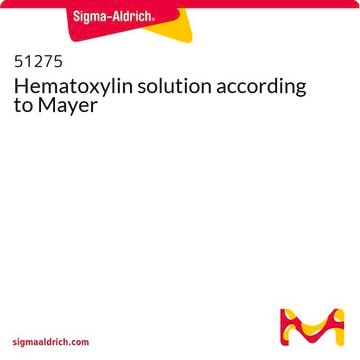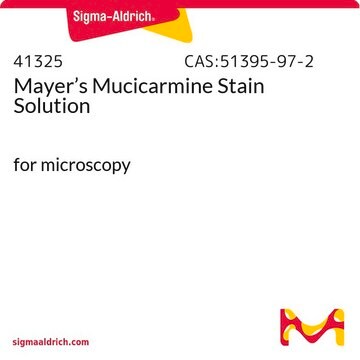Recommended Products
Quality Level
form
liquid
IVD
for in vitro diagnostic use
density
1.05 g/cm3 at 20 °C
application(s)
clinical testing
diagnostic assay manufacturing
hematology
histology
storage temp.
15-25°C
Related Categories
General description
The 500 ml bottle is sufficient for 1500 stainings. It is registered as IVD and CE certified product and can be used for clinical diagnostics. For more details, please see instructions for use (IFU). The IFU can be downloaded from this webpage.
Analysis Note
Nuclei: dark blue to dark violet
Cytoplasm: pink to red
intercellular substances: pink to red
Erythrocytes: yellow to orange
Signal Word
Warning
Hazard Statements
Precautionary Statements
Hazard Classifications
Acute Tox. 4 Oral - Eye Irrit. 2 - STOT RE 2 Oral
Target Organs
Kidney
Storage Class Code
10 - Combustible liquids
WGK
WGK 1
Certificates of Analysis (COA)
Search for Certificates of Analysis (COA) by entering the products Lot/Batch Number. Lot and Batch Numbers can be found on a product’s label following the words ‘Lot’ or ‘Batch’.
Already Own This Product?
Find documentation for the products that you have recently purchased in the Document Library.
Customers Also Viewed
Related Content
Learn about the criticality of biological tissue staining for research and clinical pathology using standard and special stains and dyes.
Learn about the criticality of biological tissue staining for research and clinical pathology using standard and special stains and dyes.
Learn about the criticality of biological tissue staining for research and clinical pathology using standard and special stains and dyes.
Learn about the criticality of biological tissue staining for research and clinical pathology using standard and special stains and dyes.
Our team of scientists has experience in all areas of research including Life Science, Material Science, Chemical Synthesis, Chromatography, Analytical and many others.
Contact Technical Service











